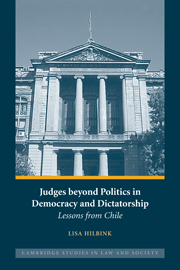Book contents
- Frontmatter
- Contents
- Acknowledgments
- Introduction
- 1 The Judiciary, the Rule of Law, and Democracy: Aspirations and Impediments
- 2 The Institutional Construction of the Judicial Role in Chile
- 3 Conservative Activism in the Heyday of Democracy, 1964–1973
- 4 Legitimizing Authoritarianism, 1973–1990
- 5 Continuity and Change after the Return to Democracy, 1990–2000
- 6 Conclusions and Implications
- Appendix A Orienting Information on Chilean Law and Courts
- Appendix B List of Interviewees (alphabetical by category)
- References
- Index
6 - Conclusions and Implications
Published online by Cambridge University Press: 08 January 2010
- Frontmatter
- Contents
- Acknowledgments
- Introduction
- 1 The Judiciary, the Rule of Law, and Democracy: Aspirations and Impediments
- 2 The Institutional Construction of the Judicial Role in Chile
- 3 Conservative Activism in the Heyday of Democracy, 1964–1973
- 4 Legitimizing Authoritarianism, 1973–1990
- 5 Continuity and Change after the Return to Democracy, 1990–2000
- 6 Conclusions and Implications
- Appendix A Orienting Information on Chilean Law and Courts
- Appendix B List of Interviewees (alphabetical by category)
- References
- Index
Summary
For many years, comparative politics scholars largely ignored how law and courts functioned in different countries, writing them off as, at best, powerless institutions in most places (Tate 1987). Because courts lack the power of purse and sword (Hamilton 1788), and because politicians often are thought to be self-interested power maximizers (e.g., Geddes 1994), political scientists (along with many citizens) gave little credence to the notion that judges, armed only with legal argument, could make a difference in political outcomes, save (perhaps) in the “exceptional” U.S. case (Tocqueville 1969; Lipset 1996).
Such a dismissive stance is no longer sustainable. People around the world are increasingly looking to judges to hold rulers to the liberal principles enshrined in their constitutions and/or in international treaties that their countries have ratified. In authoritarian regimes, such as Egypt and China, lawyers and average citizens have sought to take advantage of their governments' moves to increase judicial independence and professionalism to advance civil and political rights (Diamant, Lubman, and O'Brien 2005; Moustafa 2007). In new (or renewed) democracies, such as Argentina, Hungary, and South Africa, groups and individuals have turned to courts for everything from addressing past human rights abuses to securing long-held or newly granted social rights (Smulovitz 1995; Klug 2000; Scheppele 2003; Gloppen 2005). And in established democracies, courts remain (as in the United States) or have become (as in Canada, Israel, Italy, and the United Kingdom) a central focus for those working to protect minority rights, battle official corruption, or hold the executive accountable in the war on terror (Della Porta 2001; Lester 2004; Scheppele 2005; Woods 2005).
- Type
- Chapter
- Information
- Judges beyond Politics in Democracy and DictatorshipLessons from Chile, pp. 223 - 250Publisher: Cambridge University PressPrint publication year: 2007



